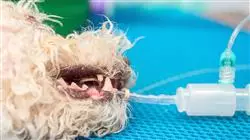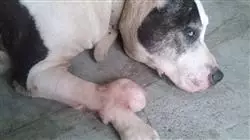University certificate
The world's largest faculty of veterinary medicine”
Why study at TECH?
Become one of the most demanded professionals today: Specialize in Cancer Diagnosis in Small Animals with this complete online Postgraduate certificate”

The first part of this intensive program will cover the imaging techniques used to diagnose and stage cancer patients. Conventional techniques such as radiology and ultrasound, and more advanced techniques such as computed tomography and magnetic resonance imaging will be discussed. Students will explore the advantages and limitations of each technique, as well as the most appropriate technique for each type of tumor.
New diagnostic techniques, such as molecular diagnostics, will also be discussed. The different molecular techniques and how they can help the diagnosis, establish a prognosis and guide the treatment will be developed, as well.
This course will delve into one of the basic pillars of oncological therapy such as oncological surgery and peri-surgical aspects. Surgical Oncology is the basis of most oncologic treatments in companion animals. Most of the treatments in oncology are based on containing or reducing tumor cells to minimize their expansion; however, in most cases, a correct surgery is the only technique capable of curing the neoplasm.
This program will define the concepts of surgical margins, palliative and cytoreductive surgery, and will describe the different methods for taking biopsies. Perioperative considerations in the oncologic patient will be analyzed.
Moreover, it is important to understand that successfully treating neoplasms is not exclusively based on surgical treatment, in many cases post and/or preoperative oncologic treatment will be necessary in the context of multidisciplinary teams of clinical oncologists, radiologists and oncologic surgeons. Therefore, treatments using chemotherapy and molecular/targeted cancer therapy, as well as newer techniques such as electrochemotherapy, will also be imparted. Their advantages and limitations will be assessed, as well as the possible side effects for each therapy.
As it is an online Postgraduate Certificate, students are not conditioned by fixed schedules, nor do they need to commute to another location. All of the content can be accessed at any time of the day, so you can balance your working or personal life with your academic life.
Achieve comprehensive and relevant training in Cancer Diagnosis in Small Animals with this highly effective Postgraduate Certificate and open new pathways for your professional progress”
This Postgraduate certificate in Cancer Diagnosis in Small Animals. Diagnostic Techniques contains the most complete and up-to-date educational program on the market. The most important features include:
- The latest technology in online teaching software
- A highly visual teaching system, supported by graphic and schematic contents that are easy to assimilate and understand
- Practical cases presented by practising experts
- State-of-the-art interactive video systems
- Teaching supported by telepractice
- Continuous updating and recycling systems
- Autonomous learning: full compatibility with other occupations
- Practical exercises for self-evaluation and learning verification
- Support groups and educational synergies: questions to the expert, debate and knowledge forums
- Communication with the teacher and individual reflection work
- Content that is accessible from any fixed or portable device with an Internet connection
- Supplementary documentation databases are permanently available, even after the course
You will have the experience of expert professionals who will contribute their experience in this area to the programme, making this program a unique opportunity for professional growth”
Our teaching staff is made up of professionals from different fields related to this specialty. That way, TECH ensures to offer the updating objective it intends to provide. A multidisciplinary team of professionals trained and experienced in different environments, who will cover the theoretical knowledge in an efficient way, but, above all, will bring the practical knowledge from their own experience to the course: one of the differential qualities of this course.
This mastery of the subject is complemented by the effectiveness of the methodology used in the design of this Postgraduate Certificate in Cancer Diagnosis in Small Animals. Diagnostic Techniques. Developed by a multidisciplinary team of e-learning experts, it integrates the latest advances in educational technology. That way, students will study with a range of easy-to-use and versatile multimedia tools that will give them the necessary skills needed during training.
The design of this program is based on Problem-Based Learning: an approach that views learning as a highly practical process. To achieve this remotely, TECH will use telepractice: with the help of an innovative interactive video system and Learning from an Expert, the student will be able to acquire the knowledge as if they were facing the scenario they are learning at that moment. A concept that will allow students to integrate and memorize what they have learnt in a more realistic and permanent way.
Make the most of the opportunity and take the step to get up to date on the latest developments in Cancer Diagnosis in Small Animals. Diagnostic Techniques"

Our innovative telepractice concept will give you the opportunity to learn through an immersive experience, which will provide you with a faster integration and a much more realistic view of the contents: Learning from an Expert"
Syllabus
The contents for this Postgraduate certificate have been developed by the different experts on the program, with a clear purpose: to ensure that our students acquire each and every one of the necessary skills to become true experts in this field.
A complete and well-structured program will take you to the highest standards of quality and success.

A comprehensive and well-structured program that will take you to the highest standards of quality and success”
Module 1. Cancer Diagnosis. Imaging and Molecular Diagnostic Techniques. Chemotherapy, Electrochemotherapy and Molecular/Targeted Therapy
1.1. Diagnostic Imaging in Cancer Patients (I)
1.1.1. Introduction to Imaging Techniques in Oncology
1.1.1.1. Radiology
1.1.1.2. Ultrasound
1.1.1.3. Computerized Tomography
1.1.1.4. Magnetic Resonance
1.2. Diagnostic Imaging in Cancer Patients (II)
1.2.1. Diagnostic Imaging Techniques in Digestive Tract Neoplasms
1.2.2. Imaging Techniques in Respiratory System Neoplasms
1.2.3. Diagnostic Imaging Techniques in Urinary System Neoplasms
1.2.4. Diagnostic Imaging Techniques in Hepatopoietic Neoplasms
1.3. Diagnostic Imaging in Cancer Patients (III)
1.3.1. Diagnostic Imaging Techniques in Cutaneous Neoplasms
1.3.2. Diagnostic Imaging Techniques in Nervous System Neoplasms
1.3.3. Diagnostic Imaging Techniques in Musculoskeletal Neoplasms
1.4. Molecular Diagnoses
1.4.1. Molecular Diagnostic Techniques
1.4.2. Quantification and Gene Expression
1.4.3. Personalized Therapy in Cancer
1.5. Principles of Surgical Oncology (I)
1.5.1. Pre-operative Considerations
1.5.2. Preoperative Approach
1.5.3. Biopsies and Sample Collecting
1.6. Principles of Surgical Oncology (II)
1.6.1. Surgical Considerations
1.6.2. Definition of Surgical Margins
1.6.3. Cytoreductive and Palliative Surgeries
1.6.4. Post-operative Considerations
1.7. Chemotherapy (I)
1.7.1. What Is Chemotherapy?
1.7.2. Dosage
1.7.3. Species Characteristics
1.8. Chemotherapy (II)
1.8.1. Antitumor Antibiotics
1.8.2. Alkylating Agents
1.8.3. Usage Inhibitors
1.9. Electrochemotherapy
1.9.1. Basis of Electrochemotherapy
1.9.2. Neuroeducation Applications
1.9.3. New Horizons
1.10. Molecular/Targeted Therapy
1.10.1. Genetic Therapy
1.10.2. Tyrosine Kinase Inhibitors
1.10.3. Angiogenic Therapy
1.10.4. Metronomic Therapy
1.10.5. Emerging Therapeutic Agents

A comprehensive teaching program, structured in well-developed teaching units, oriented towards learning that is compatible with your personal and professional life"
Postgraduate Certificate in Cancer Diagnosis in Small Animals. Diagnostic Techniques
At TECH Global University, we present our innovative Postgraduate Certificate in Cancer Diagnosis in Small Animals, designed to provide you with the necessary knowledge to detect and diagnose this disease in companion animals. This program is taught online, which allows you to access classes from anywhere and enjoy the benefits of distance learning. Our online classes give you the flexibility to study at your own pace and adapt the learning to your schedule and needs. You will be able to access the program content at any time, review it as often as you wish and participate in interactive activities that will enrich your learning experience. In addition, you will have the support of veterinary professionals specialized in oncology who will guide you on your path to excellence.
Master the techniques to detect and treat this disease
In TECH Global University's Postgraduate Certificate in Cancer Diagnosis in Small Animals, you will explore the different diagnostic techniques used in the early detection of cancer in companion animals. You will learn to interpret results of laboratory tests, radiographic and ultrasound images, biopsies and other diagnostic methods, allowing you to accurately identify and evaluate the presence of this disease. Through clinical cases and practical examples, you will acquire the skills necessary to develop individualized treatment plans and offer appropriate therapeutic options for each patient. You will learn about the most recent advances in the field of veterinary oncology and be prepared to face the challenges that this disease presents in clinical practice. The Postgraduate Certificate will provide you with the tools and knowledge you need to make a difference in the lives of animals and their families. Your education at TECH will open new professional perspectives in the field of veterinary oncology and will make you a reference in the diagnosis and treatment of cancer in companion animals. Don't miss the opportunity to specialize in the diagnosis of cancer in small animals. Enroll today in our Postgraduate Certificate in Cancer Diagnosis in Small Animals and acquire the skills necessary to provide early and accurate diagnosis in this disease.







